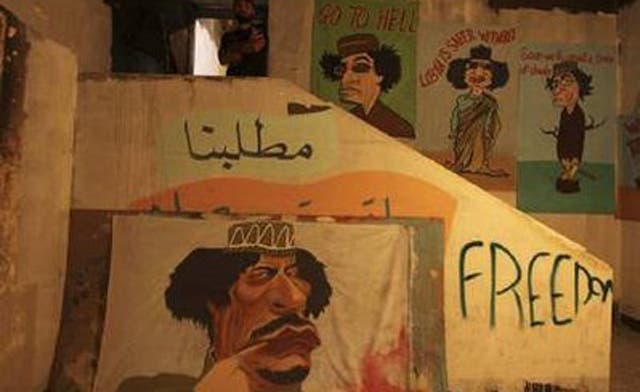European Union to open office in Libyan revolt stronghold as NATO bombs Tripoli
The European Union plans to open an office in Libya's revolt-held city of Benghazi to shore up assistance for the opposition to Libyan leader Muammar Qaddafi, foreign policy chief Catherine Ashton of the EU said Wednesday.
“I intend to open an office in Benghazi so that we can move forward on the support we've discussed to the people,” Ms. Ashton told the European Parliament, according to Agence-France Presse.
The aim of the new office would be “to support civil society, to support the interim national council ... to support security sector reform, to build on what the people ask us to,” she added.
“They want health and education, health-care, security on the borders, the kind of support we are able to give them and want to give them.”
Her statement came the same day opposition leader Mahmoud Jibril, of the opposition National Transitional Council (NTC), was to meet with key US lawmakers.
The United States has yet to recognize the NTC as the legitimate representative of the Libyan people. France, Italy, Qatar and Gambia have already done so.
Ms. Ashton’s statements also came as explosions rocked eastern Tripoli for almost an hour on Wednesday morning as jets flew overhead, a witness said.
An international coalition began carrying out strikes on forces loyal to Colonel Qaddafi on March 19. NATO took command of operations over Libya on March 31.
The Libyan regime has accused NATO of several attempts on Qaddafi’s life, including an air strike that killed his second youngest son Saif al-Arab Qaddafi and three of his grandchildren.
Secretary General Ban Ki-moon of the United Nations, meanwhile, said he had urged Libya's prime minister to immediately stop attacks on civilians and called for a halt to the fighting in the country.
Mr. Ban said he was dispatching a UN envoy to Tripoli after calling Prime Minister Baghdadi Mahmoudi of Libya on Tuesday.
“I told him the Libyan authorities must stop attacking civilians, I said there must be an immediate verifiable ceasefire negotiations towards the peaceful resolution of the conflict and unimpeded access to humanitarian workers,” Ban told journalists, AFP reported.
Mr. Ban also said there “should be an end of fighting in Misrata and elsewhere” to allow political dialogue and humanitarian assistance.
Libyan protesters, meanwhile, said they had made gains by driving back Colonel Qaddafi’s troops on the eastern and western edges of the port city of Misrata and encircling them at the airport.
The protesters also said late on Tuesday they had taken the town of Zareek, about 25 km (15 miles) west of Misrata, but no independent verification of their statements was available, according to Reuters.
Misrata, a city of half a million people, has been besieged by Mr. Qaddafi’s forces for eight weeks. It is strategically important to revolt hopes of overthrowing the Libyan leader because it is the only city they hold in the west of the North African country.
NATO launched missile strikes earlier on Tuesday in the Tripoli area on targets that appeared to include Colonel Qaddafi’s compound, witnesses said. NATO said later it carried out a strike against a government command and control post in the capital.
After two months of revolt linked to this year's uprisings in other Arab countries, the war has reached a stalemate. Protesters hold Benghazi and other towns in the oil-producing east while the government controls the capital and almost all of the west.
Thousands have been killed in the fighting in the vast country, which has a population of more than six million.
The government says the protesters are armed criminals and Al Qaeda militants and that the majority of Libyans support the 68-year-old colonel, who has been in power since 1969.
He has not appeared in public since April 30, when a NATO air strike on a house in the capital killed his youngest son and three of his grandchildren.
The proximity of Colonel Qaddafi’s forces to civilian areas made it hard for NATO to carry out its mandate of protecting civilians, Brigadier-General Claudio Gabellini, chief operations officer of NATO’s Libya mission, told reporters in Brussels, according to Reuters.
He said NATO had still managed to destroy more than 30 military targets in Misrata since April 29.
"Pro-Qaddafi forces have continued to shell the citizens of Misrata with long-range artillery, mortars and rockets, indiscriminately firing high explosive rounds into the city," said Mr. Gabellini.
The Libyan government says NATO's intervention is an act of colonial aggression by Western powers bent on stealing the country's oil.
The war has caused misery for tens of thousands forced to flee overland or by boat.
The United Nations said Monday nearly 750,000 people have fled the six million people country since the start of the conflict.
(Abeer Tayel of Al Arabiya can be reached at: [email protected])
